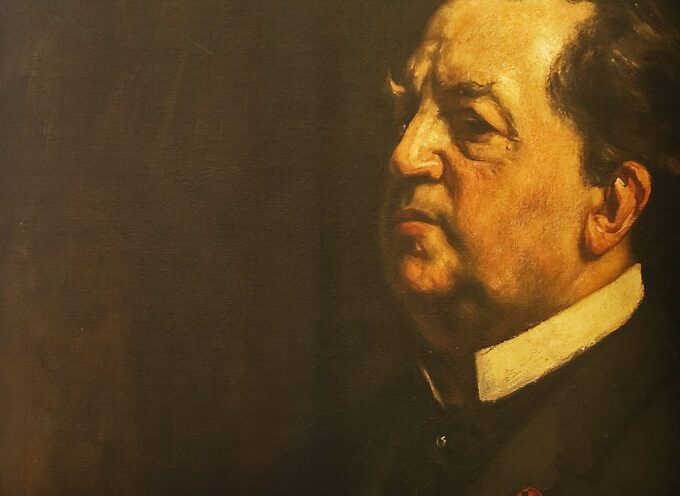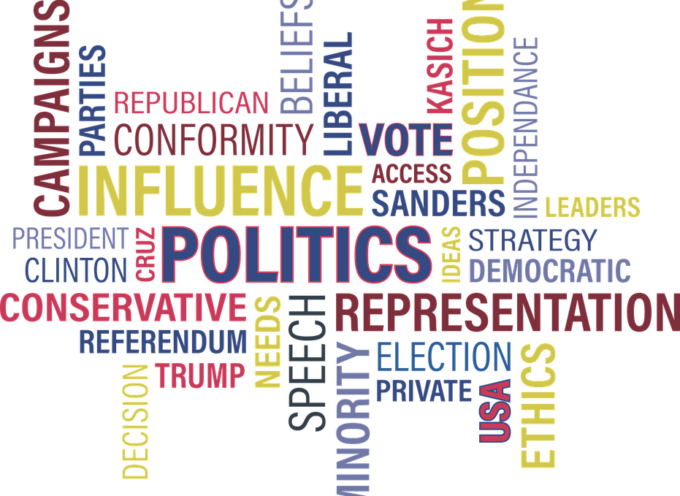David Koyzis is one of the premier political scientists of our day. David currently teaches political science at Redeemer University College (Ancaster, Ontario) and will soon be announced as a Fellow in Political Science at the St. George’s Center for Biblical and Public Theology. He is probably best known for the publication of his award-winning Political Visions and Illusions (2004), a book that leverages the Christian concept of idolatry to critique modern political ideologies.
More recently, he published We Answer to Another (2014), a distinctively Christian treatment of “authority.” I read everything David writes, but this book especially caught my attention because of how today’s political controversies involve contrasting views of authority. After reading the book, I asked David if he would be willing to engage in a public interview about his view of authority, especially as it relates to three prominent political ideologies—libertarianism, socialism, and nationalism.
Bruce Ashford: David, thank you for agreeing to interview. Let’s start with the question, “Who is David Koyzis? Some of our readers will not know who you are, so tell us a little bit about yourself, including a fun fact or two.
David Koyzis: I was born outside of Chicago and have lived in Canada for a total of 32 years. I taught political science at Redeemer University College for 30 of these years and will shortly be retiring. I have written two books, Political Visions and Illusions and We Answer to Another: Authority, Office, and the Image of God. The first book was translated into Portuguese and has been received enthusiastically in Brazil. I have a wife and daughter, and we live in Hamilton, Ontario, Canada.
Fun facts? I have Greek Cypriot roots on my father’s side, and my mother’s ancestors were among the first settlers in Virginia and Maryland in the 17th century. I sometimes call myself a Byzantine-rite Calvinist. I have a great love for the Psalms and have set a number of them to verse over the past three decades, as well as arranging and, in some cases, composing the tunes.
One of the more unusual facts about me is that I used to listen to opera on the radio at age 13, even though by now I much prefer choral music to opera.
Bruce Ashford: Recently, you published We Answer to Another. What is the thesis of the book, and what was your motivation in writing it? In other words why this particular thesis?
David Koyzis: Yes, well, We Answer to Another grew out of my graduate work at Notre Dame in the 1980s. I wrote my dissertation on two political theorists, Herman Dooyeweerd, a Reformed Christian philosopher in the Netherlands, and Yves René Simon, a French Catholic philosopher in the tradition of the mediaeval theologian Thomas Aquinas. Simon wrote rather extensively on authority in an effort to rehabilitate it after having acquired a bad reputation during the French Revolution. In the years following my graduate studies, I returned to the concept of authority, and the result was this book.
In my research I came to the conclusion that authority has been misunderstood in a number of ways. It has been confused with several manifestations of power, it has been seen as the opposite of liberty, and it has been identified with the higher offices in a hierarchical organization. I am convinced that all of these are wrong and that generations have been misled by these mistaken understandings of the nature of authority.
My thesis is that authority is integrally connected with our creation in God’s image. In so far as we are God’s image, we are granted a multifaceted authority over ourselves, over each other and over the rest of creation. In this respect, even what we are inclined to call freedom, that is, the right to live our lives and set our own goals, is really another form of authority. We are embedded in a huge variety of authoritative relationships and institutions. Authority really is a fundamental concept. It is impossible to make too much of it, even as many claim to dislike it.
Bruce Ashford: You mention that authority has been misunderstood in a number of ways. I think it would be helpful to contrast your view with the view of authority operative in a couple of modern political ideologies. Let’s consider socialism and libertarianism. What is their view of authority, and how does your view differ?
David Koyzis: In both cases we see a general hostility to authority.
Libertarianism is really an early form of liberalism that was recovered in the 20th century by the likes of Friedrich Hayek, Ludwig von Mises and others. It follows a principle articulated by John Stuart Mill in the 19th century, sometimes known as the harm principle. It runs like this: “the only purpose for which power can be rightfully exercised over any member of a civilized community, against his will, is to prevent harm to others.” Originally this was intended to apply only to the state, whose coercive power must be kept within strict bounds. From the libertarian perspective, a parliamentary body should not be legislating morality. The state makes no effort to impose and enforce social mores on the larger polity, and individuals should be granted the widest possible space for exercising their liberty. As long, of course, as they do not injure others.
However, at this latest stage in the liberal project, there has been a concerted effort to extend Mill’s harm principle into other areas of life where it does not really belong. In the real world all communities impose standards on their members, and not all of these are related to protecting them from injury or from doing harm. For example, a church congregation expects its members to confess the Christian faith and to live according to the Word of God. It further expects them to come together to worship God every week, even though their staying away for long stretches does no obvious harm to fellow members. Similarly, our daughter’s high school mandates the wearing of school uniforms. Not wearing the uniform does no evident injury to anyone, yet the school requires it all the same.
Our societies are made up of countless communities which impose on their members standards that vary from one to the next. Once the libertarian impulse has overtaken the state institution, it is difficult to limit it to the state alone. Yet if all communities were to adopt the harm principle and abandon the very standards that support their unique identity, the result would be an homogenizing of these communities. Every community, even marriage, family, church and state, becomes a mere voluntary association stripped of every claim to authoritative status. In this respect, libertarianism, which begins with a healthy suspicion of state action, ends in a kind of totalitarianism suspicious of all authorities and standards not rooted in the freely choosing wills of individuals.
As for socialism, we haven’t seen a lot of its influence in the United States until very recently. More so in Canada, which has a democratic socialist party—the New Democratic Party—which has never come to power in Ottawa but has governed half of the provinces at one time or another. It used to be that the mere mention of socialism in the US was the kiss of death politically speaking. That’s why I was greatly surprised that a professed socialist, Bernie Sanders, would garner as much support as he did in last year’s presidential election. The country has changed a lot in the time I’ve been away, it seems.
But, yes, socialism too is suspicious of claims to authority. In its Marxian variant, we see an effort to unmask such claims as cynical attempts by the few oppressors to maintain their privileges and power over the many oppressed. Socialists believe that the division of labor and private property are the sources of society’s ills and that communal ownership and the elimination of classes will bring redemption. To be sure, socialists are not anarchists. Nevertheless, Marxists in particular are convinced that the coming classless society will be characterized by more mutual relationships among equals and the circulation of people through a variety of work-related occupations. All of this will bring liberation to humanity at last.
Of course, what we see with both libertarians and socialists is a concerted attempt to debunk all authority except their own. Libertarians strive to extend the liberating harm principle into all areas of life, which ironically requires a large state apparatus to bring about. Socialists similarly use to the mechanisms of government to effect an egalitarian society. As it turns out, libertarians and socialists are not so very different after all.
Bruce Ashford: You point out that libertarianism has emerged relatively recently (20th century) and that socialism is just now making some real inroads into American politics. That leads me to ask you about a third political ideology—nationalism—whose influence is rising not only in the United States but across the Western world. How do nationalists tend to view authority?
David Koyzis: Let’s back up a little. I’m not at all certain that socialism as such is making real inroads into the American political landscape. Ironically, as a socialist, Sanders is very much an individualist, more resembling Jimmy Stewart in Mr Smith Goes to Washington (1939) than Marx or Lenin. In short, Sanders is not an atypical American reformer even as he assumes a label suggesting otherwise.
But, yes, nationalism. I’ve told my students that I have a blind spot as far as nationalism is concerned. That’s because my father’s family in Cyprus became refugees overnight back in 1974 when the northern part of the island was invaded and occupied by Turkey. Turkey responded to the ethnic Greek nationalism that sought to annex Cyprus to Greece. In the late 1950s Greek nationalists had launched a guerrilla war against British colonial rule, and they made life difficult for our relatives who were less keen on seeing the island absorbed into Greece.
Yet nationalism is a powerful force, because it plays on real elements of commonality that bind people together into national communities. By contrast, multiculturalism, which became official policy in Canada in the 1970s, goes against the grain for most people because it tries, somewhat implausibly, to make the very differences that separate cultural communities into a common bond. Nevertheless, most people can see through this, recognizing that, if a nation is to thrive, it must nurture the commonalities and not the differences. By itself the state cannot create such commonalities, but it can certainly work to augment the ones that already exist.
Sadly, however, the very people who can see through the claims of multiculturalism are less adept at seeing through the allure of nationalism, which makes an idol of the nation. Nationalists of all stripes view the nation as the object of their highest allegiance. Their nation is, furthermore, superior to all other nations. Gus Portokalos, the lovable father from My Big Fat Greek Wedding (2002), claims that the Greeks invented everything and that the world is made up of Greeks and those who wish they were Greek. Of course, he’s an amusing caricature, and his pride in his Greek roots is taken to comical lengths. But when flesh-and-blood human beings fall prey to this sense of national superiority, they come to excuse the inexcusable—to rationalize the irrational—and all in the name of bringing glory to the nation. One hates to keep bringing up the German national socialists and the Italian fascists in this context, but they were only the most extreme manifestations of a tendency found throughout the world.
Now authority. Like the partisans of other ideological visions, nationalists tend to play down what I have called the pluriformity of authorities, that is, the legitimate existence of multiple communities and agents for which we bear responsibility and to which we owe allegiance. As human beings created in God’s image, we bear multiple authoritative offices relevant to the various communities of which we are part. I am simultaneously a husband, father, son, brother, church member, employee, citizen and so forth. None of these can properly claim my highest allegiance, which belongs to God alone. Nationalism denies this multiplicity, claiming for the nation what is properly God’s.
Bruce Ashford: Thank you. You know, when we talk about any of the modern political ideologies, people are concerned with the way they view power. In fact, in my opinion, they often treat authority and power as if they are essentially the same thing. Yet, in We Answer to Another, you argue that they are not the same. Why do you say that authority should not be identified with power?
David Koyzis: Because power is simply the ability to get things done. The fact that you can do something doesn’t necessarily mean you have the right to do it, at least not whenever you are of a mind to do so. I can ride a bicycle, but I have no authority to ride it on a limited-access highway reserved for motor vehicles. I can sing and accompany myself on guitar, but I have no authority to do that when, for example, I’m teaching or grocery shopping or attending a stage play.
Like authority, power comes in many forms and manifests itself in different ways. There is the psychological power people exercise over others in subtle ways. There is the power to persuade others to come onside of your agenda. There are also material incentives and disincentives that move people to follow others. There is the force of many wills coming together in a contractual relationship. There are superior leadership skills. And, finally, knowledge itself is a kind of power.
But none of these is to be identified with authority as such. One of the key errors of our age is to assume that mere ability translates into authority. The 17th-century English philosopher Thomas Hobbes argued in effect that might makes right. Revolutionaries in every age are convinced of their superior knowledge and believe that this should weigh more heavily than the formal offices held by the embattled political leaders. And they are willing to impose this certainty on others through coercive force.
Yet even in everyday experience, we intuitively sense that this is wrong. If a would-be thief confronts you in a dark street and demands your wallet at knife-point, you will likely give it to him to avoid the negative consequences of not doing so. That, of course, does not mean he has the right to your wallet. He may have the power to grab it, but lacks the authority to do so. This has relevance in social and political life as well.
When people assert the right to do something based solely on their ability to do it, this is a recipe for tyranny. When people deny or deprecate authority, they are in effect refusing to acknowledge the legitimate limits that constrain them as they live their lives and relate to others, with profoundly negative implications for our political communities, which are called to do justice within these limits.
But far from being a necessary evil, authority is actually a positive good! It is gift of God’s grace to enhance our flourishing as those created in his image. It enables orchestras to produce beautiful music, schools to educate the young, and business enterprises to provide goods and services to the public. In that respect authority is worth celebrating.
Subscribe
Never miss a post! Have all new posts delivered straight to your inbox.







